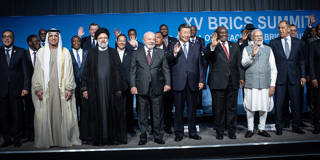Now that the BRICS (Brazil, Russia, India, China, and South Africa) will accept new members, one wonders if the grouping can pose a genuine challenge to the prevailing global-governance institutions. As in the past, the group's influence will depend on its effectiveness, not on its composition or size.
LONDON – When I coined the BRIC acronym back in 2001, my primary point was that global governance would need to adjust to incorporate the world’s largest emerging economies. Not only did Brazil, Russia, India, and China top the list of that cohort; they also were collectively responsible for governing close to half of the world’s population. It stood to reason that they should be represented accordingly.

LONDON – When I coined the BRIC acronym back in 2001, my primary point was that global governance would need to adjust to incorporate the world’s largest emerging economies. Not only did Brazil, Russia, India, and China top the list of that cohort; they also were collectively responsible for governing close to half of the world’s population. It stood to reason that they should be represented accordingly.